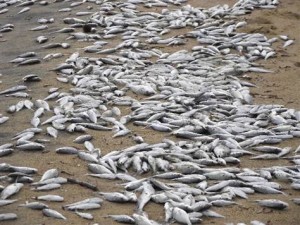(Reuters) – When writer Anton Chekhov arrived on the Russian island of Sakhalin in 1890, he was overwhelmed by the harsh conditions at the Tsarist penal colony. It wasn’t just the floggings, forced prostitution and ill-treatment of children in the colony. It was the environment itself. “There is no climate on Sakhalin, just nasty weather,” Chekhov wrote. “And this Island is the foulest place in all of Russia.”
More than a century on, Sakhalin’s prisoners have been replaced by oil and gas workers, most of whom seem to agree that Chekhov’s description still fits.
The sparsely populated island — which is the length of Britain — has some of the most extreme weather on earth. Marine cyclones and violent snowstorms rip through its forested hills, and the ocean waters off its northern coast freeze solid for a good part of the year. In winter, temperatures drop to minus 40 Celsius and snow can pile three meters high.
Workers at Exxon’s Odoptu oil field, eight km (five miles) off the northeast coast of Sakhalin, had to shovel their way out of their dormitory last winter to clear pipe valves and free oil pipelines of snow. “The blizzards were so bad that at one point we had to evacuate half of the staff,” says Pavel Garkin, head of the field’s operations.
Now Moscow hopes to attract global oil players to another extreme location: its icy Arctic waters. Shared by Canada, Denmark, Iceland, Norway, Russia and the United States, the Arctic may hold around one-fifth of the world’s untapped oil and gas reserves according to a U.S. Geological survey. The past few years have seen a rush of activity in the region, with UK oil explorer Cairn Energy drilling for oil off the west coast of Greenland and Norway’s Statoil, one of the world’s largest offshore oil producers, pushing further and further up the Nordic country’s serpentine coastline, drilling wells inside the Arctic Circle beneath both the Norwegian and Barents Seas…
To read the rest of this article, visit the link below:
SeaWeb – Ocean News
Note: Newswire stories are provided as a courtesy of OceanDoctor.org. Content of these articles is provided by external sources.
 Over the last 10 years, thousands of scientists have collaborated on an enormous research effort to catalog the plants and animals in the world’s oceans.
Over the last 10 years, thousands of scientists have collaborated on an enormous research effort to catalog the plants and animals in the world’s oceans.

 When you hear “pipeline” in Hawai’i, the first thing you think of is that quintessential
When you hear “pipeline” in Hawai’i, the first thing you think of is that quintessential